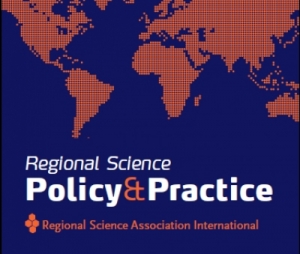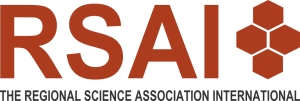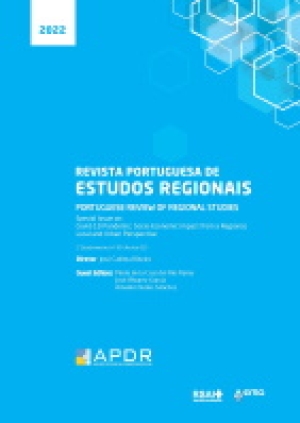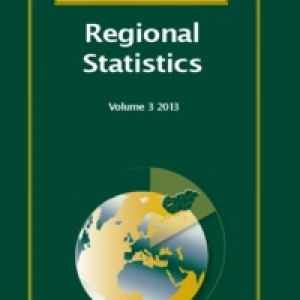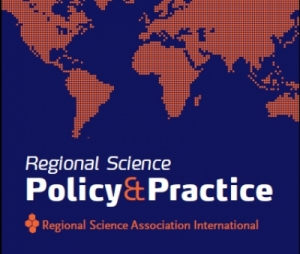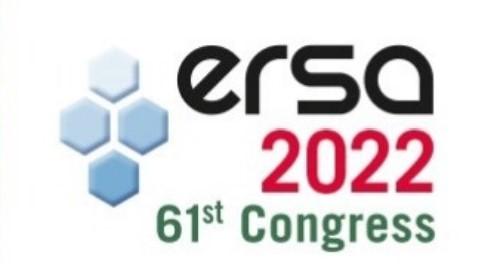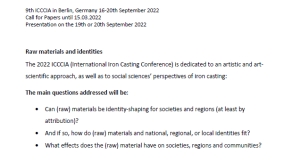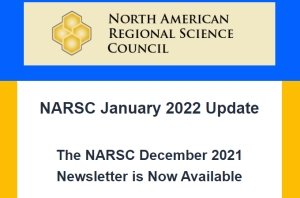Council
Elisabete Martins
RSPP Call for Papers | Special Issue on Pathbreaking trajectories: Socio-economic and Institutional de-peripheralization of marginal areas
Regional Science Policy & Practice (RSPP)
Call for papers for RSPP Special Issue on Pathbreaking trajectories: Socio-economic and Institutional de-peripheralization of marginal areas
In recent decades, economic and political inequalities between different macro-areas of the world have increased. Moreover, spatial inequalities within macro-areas have also grown. In this scenario, the relations between economy-politics-society at the local level have become more kaleidoscopic and entropic than in the second half of 20th Century.
Against this background, new scholarly and policy attention has been devoted to peripheral, marginal, or ‘left-behind’ areas, i.e., those territories in which the economy is struggling, institutions are producing vicious lock-in type cycles, social elites are strengthening themselves through extractive and appropriative orientations towards public goods, and de-anthropization and depopulation are growing. At the same time, it becomes urgent to investigate further the reverse processes, i.e., under what circumstances peripheral areas can extract themselves – at least partly – from their marginality.
The time is, indeed, ripe to solicit a comprehensive and in-depth international examination of a counterintuitive and unexpected puzzle: what are the economic, social and institutional mechanisms that make it possible for peripheral areas to regain centrality and vitality unexpectedly, even in a short time span?
This special issue aims to collect contributions concerning these unexpected phenomena of pathbreaking trajectories that is the economic and institutional de-peripheralization of marginal areas. To this end, we intend to bring together scientific contributions from interconnected research fields mainly related to geography, sociology, political science and public policy, political economy, and anthropology – shedding new light on the processes that the de-peripheralization of marginal areas rely upon. This reasoning is based on a general assumption according to which simple geographic features do not determine per se socio-spatial divisions and peripheralization. Peripheral areas are not natural; they emerge as a result of (not neutral) processes that imply hierarchical and power relationships. This has been emerging in a contradictory scenario. The world is increasingly global, but balkanized nonetheless; suffice it to say that new fractures between Northern and Southern Europe have occurred, intersecting with those between East and West Europe; North America-Central America; Rural and urban China, etc.
In other words, peripheral spaces are produced; they can be the outcomes of more or less intentional construction processes pertaining to institutional and political assets, relational patterns and social norms, and the unequal allocation of economic resources. It therefore becomes essential to observe how and if multidimensional socio-economic changes may occur within peripheral areas deconstructing their marginality. In the literature, the attempt of demarginalization of peripheral areas have been often analyzed with respect to top-down initiatives; that is initiatives coming from political center(s) and directed towards peripheries (i.e., development aid programs, exogenous investments, national and international cooperation to support disadvantaged places, etc.). By contrast, this Special Issue intends to systematize and promote those studies that assume an internal point of view to peripheral areas, focusing on autonomous dynamics that are mainly endogenous to those contexts.
Strictly speaking, we invite papers including, but not limited to, contributions on the following aspects:
- Institutional changes making a given area or region less marginal. These dynamics occur through the displacement of institutional assets or their more or less intentional adaptation/conversion to some shifts of the socio-economic Therefore, we are soliciting papers that analyze the mechanisms leading to the formation in peripheral areas of political economy structures overcoming previous consolidated weaknesses so that the institutional assets become more robust.
- Collective actions and 'self-governance' processes at the local level. Here we refer to papers investigating the determinants of the emergence in peripheral areas of “social molecules or groups” enhancing the governing of common and public goods that can help to enlarge social well-being and reduce economic In this respect, investigations are relevant about different types of government and production of ‘common goods’ emerging from below that assert themselves as local resistance entities against hegemonic forms of
- Changes in the relational networks of elite groups. It can be said that how elites are interconnected internally and tied to economic and political spheres vary in different In this respect, marginal areas are often characterized by: i) restricted and mutually disconnected elite circles, with a predatory orientation, thus subjugating the economic and political spheres; ii) elite networks that can penetrate politics and economics circles, so to establish mutual dependence and patronage patterns of resource Hence, it is relevant to consider investigations reconstructing the dynamics through which relational patterns of the elites that are less hostile towards the general interest can be established. More precisely, we refer to papers investigating how and if elite networks marked by “embedded autonomy” – which favor a developmental orientation from the State, links between economy-politics-society in the light of mutual independence – occur.
- Economic renewal and innovation. A way through which peripheral areas redeem themselves concerns the economic renewal of abandoned industrial sectors and spaces, the new emergence of craftsmanship sectors, and other types of economic Reorientations that result in lasting development processes are rare and difficult to To understand success cases in the light of examples of failure, there needs to be empirical investigations on how the strategies of political economies support the formation of new relational patterns between the actors of innovation and the different institutions at the spatial level. Also, evidence is needed on where and how spontaneous dynamics of economic renewal or industrial reconversion or revitalization emerge. Hence, the demarginalization processes of peripheries re-orienting their development path is a way to observe the social and political/institutional re-embedding of economic activities.
We invite papers from a range of perspectives, different disciplines, and from around the world. Contributions combining empirical investigations well framed in clear conceptual frameworks are well- suited for the Special Issue. Comparative papers suggesting some policy orientations will be also highly appreciated.
Authors are invited to submit an abstract by the 15th of April 2022 to Luca Storti (This email address is being protected from spambots. You need JavaScript enabled to view it.), Giulia Urso (This email address is being protected from spambots. You need JavaScript enabled to view it.) and Neil Reid (This email address is being protected from spambots. You need JavaScript enabled to view it.). Abstracts should be between 250 and 500 words in length. We will inform everyone on or around May 1, 2022, as to whether their abstract has been accepted for the special issue. Full papers are expected by 1st December 2022, and publication expected in fall 2023, following the peer review process.
Submission of complete papers
to: https://rsaiconnect.onlinelibrary.wiley.com/journal/17577802, at the submission add in the cover letter that is for the Special Issue on: Pathbreaking trajectories: Socio-economic and Institutional de-peripheralization of marginal areas
Call for Papers | 2022 SRSA Annual Meeting in Austin, TX
Join us for the 61st Annual Meeting of the Southern Regional Science Association at the Sheraton Austin Hotel at the Capitol April 7-9, 2022
Submit Individual Abstracts and Organized Sessions by February 1st at www.srsa.org
Upcoming Deadlines
Early Bird Registration Discount: February 1st
Moriarty Graduate Student Paper Award: February 15th
William H. Miernyk Research Excellence Medal: February 24th
Additional information can be found at 2022 SRSA Conference Website
Space Odyssey International Film Festival
Dear RSAI members,
I hope this email finds you well.
The new year starts with yet another initiative from the Association, promoted by its President, Prof. Eduardo Haddad. The RSAI is happy to announce the first edition of the RSAI Film Festival!
If you are a Regional Science enthusiast, join the “Space Odyssey International Film Festival” and share your passion to our discipline. You can choose one of the four awards categories to address for a wide audience of non-specialists different aspects of Regional Science:
My research in Regional Science: Let us learn about your research! You could focus on the results of a specific paper, your thesis or dissertation, or even an ongoing research project or idea. Why not telling us about your preferred method and how you use it to understand regional science topics? It is your call!
What is Regional Science?: Can you answer this question by explaining to a broader audience what Regional Science is about? Or do you prefer addressing it to an initiated community? In any case, there are many people eager to learn what we do. Let them know!
Regional Science applications in the Global South: Spatial, interregional, and regional analytic approaches can be used and, if necessary, adapted, to realize much more probing attacks on regional and spatial problems in the developing world. Can you share specific case studies and/or applications of Regional Science methods to countries/regions in the Global South?
Regional Science sections and centers around the globe: Are you a proud member of a national section? Are you part of a research group engaged in the field of Regional Science? Why don’t you share the information about your section or research center? We bet many people in our community would benefit from that!
Check the rules of the Space Odyssey here.
We look forward to watching your movies soon,
Kind regards,
Revista Portuguesa de Estudos Regionais/Portuguese Review of Regional Studies: issue N. 60 (2022) published
It is a pleasure to inform you that the issue n. 60 (January 2022) of our journal (Revista Portuguesa de Estudos Regionais / Portuguese Review of Regional Studies) is now available online. I also want to inform you that the journal has now a new website.
You can accede to the issue and the new website using the following link:
https://www.review-rper.com/index.php/rper/issue/view/60
As we can check, this issue is entirely devoted to the Pandemic CONVID-19 Impacts and has as Guest-Editors María de la Cruz del Río Rama, José Álvarez García and Amador Durán Sánchez, from two universities in Spain.
Thank you for contributing to the success of the journal. We will go on counting on you!
Best regards,
J. Cadima Ribeiro
Editor-in-Chief of RPER
The New Issue of Regional Statistics is already Available! (2022, VOL 12, No 1)
We are pleased to inform you that a new issue of the Regional Statistics has been released and now it’s avaiable online.
https://www.ksh.hu/terstat_eng_current_issue
REGIONAL STATISTICS, 2022, VOL 12, No 1.
STUDIES
Judit Kapas: Has COVID-19 caused a change in the dynamics of the unemployment rate? The case of North America and continental Europe
https://www.ksh.hu/statszemle_archive/regstat/2022/2022_01/rs120107.pdf
Katalin Antalóczy – Imre Birizdó – Magdolna Sass: Local investment promotion in a Hungarian medium-sized town and the implications of the COVID pandemic
https://www.ksh.hu/docs/hun/xftp/terstat/2021/rs120104.pdf
Evelyn Calispa Aguilar: Regional systems of entrepreneurship in 2017–2018: An empirical study in selected regions of South America
https://www.ksh.hu/statszemle_archive/regstat/2022/2022_01/rs120103.pdf
Loránt Pregi – Ladislav Novotný: Impact of migration and natural reproduction on the development of the Slovak–Hungarian ethnic boundary in eastern Slovakia, 1991–2018
https://www.ksh.hu/statszemle_archive/regstat/2022/2022_01/rs120102.pdf
Kostas Rontos –Michail Papazoglou – Maria-Eleni Syrmali – Adele Sateriano: Towards the eastern gate to Europe: Factors shaping perceptions and attitudes towards migrants in Lesvos Island (Greece), 2016
https://www.ksh.hu/statszemle_archive/regstat/2022/2022_01/rs120105.pdf
Dávid Sümeghy: Halo effect of diversification and polarization, and the role of relative deprivation based on the 2018 Swedish parliamentary elections results
https://www.ksh.hu/statszemle_archive/regstat/2022/2022_01/rs120106.pdf
Ngo Thai Hung: Return equicorrelation and dynamic spillovers between Central and Eastern European, and World*1stock markets, 2010–2019
https://www.ksh.hu/docs/hun/xftp/terstat/2021/rs120108.pdf
Mohammad M. Jaber: Analysis of selected economic factor impacts on CO2 emissions intensity: A case study from Jordan, 1990–2015
https://www.ksh.hu/statszemle_archive/regstat/2022/2022_01/rs120101.pdf
Join us to our social networking sites:
RSPP Call for Papers | Special Issue on Population imbalances in Europe
Regional Science Policy & Practice (RSPP)
Call for papers for RSPP Special Issue on Population imbalances in Europe
Edited by
Prof. Rubén Garrido Yserte (University of Alcalá, Director)
Prof. Juan R. Cuadrado Roura (University of Alcalá, Jean Monnet Chair)
Associated to Papers presented in the
SETTLE International Congress: “Population imbalances in Europe”
This Congress is part of an ERASMUS+ entitled: “Population imbalances in Europe: challenges of urban concentration versus rural depopulation” (SETTLE). It will be held on-site on 27th, 28th and 29th April 2022 at the University of Alcala (Spain); organized by the Jean Monnet Chair “Economic Policy and European Union” and the Institute for Economic and Social Analysis (IAES). The SETTLE Congress is open to researchers, academics, students, public authorities and professionals. Attendance is allowed with or without the presentation of a paper or a poster. Registration is free up to 125 participants, and includes the right for attending, presenting papers and receiving the congress papers, as well as the meals during the Congress. Among them, travel and hotel expenses will be funded up to 40 participants on restrictive and justified terms, imposed by the project regulation (the project counts on the financial support of the European Commission). Thus, the economic need, the interest of the paper and the order of reception will be considered. In this sense, posters will be less valued for allowing travel and expenses funding but will be equal considered for the right of attending and meals.
Paper proposals consisting of a summary of around 100 words must be submitted before 5th February, 2022. Accepted languages for papers writing and presentation are Spanish, English and French. Writing font is Calibri 11, 1.15 pp. Papers will be circumscribed geographically to Europe-27 and neighbor countries (though others can be included if they have an influence in the European region or can be compared to it in terms of population subjects). Focus can stem from Economics, Geography, Environmental Science, Law, History or any enabling discipline. Suggested topics are:
- Regional policy design for a balanced population
- Rural-urban proximity
- Services infrastructure and welfare for population in cities and rural areas
- Depopulation
- Entrepreneurship and university talent attraction leading to urban concentration
- Population imbalances and migration
- Environmental and legal aspects of sustainability in smart cities and depopulated areas
- Population statistics advances
- Systemic transformation and influence on population
- Others related (to be evaluated)
After the assessment of the Scientific Committee, accepted papers will be informed by end February. The final delivery for accepted papers will be 29th March 2022, for their inclusion in an electronic diffusion support. Selected papers will be published in two peer review journals: ‘RSPP’ - Regional Science Policy and Practice (ESCI and SJR) and ‘ICE’ - Información Com. Española. Both publications follow strict criteria of quality for publication.
Paper proposals should be sent to the Congress Desktop: This email address is being protected from spambots. You need JavaScript enabled to view it.
Scientific Committee local coordination team:
SETTLE Scientific Committee and Network
Congress Secretary:
Instituto Universitario de Análisis Económico y Social - IAES (University of Alcalá)
http://www.iaes.es/settle-2020.html).
Submission of complete papers to: https://rsaiconnect.onlinelibrary.wiley.com/journal/17577802, at the submission add in the cover letter that is for the Special Issue on: Population imbalances in Europe
Forthcoming ERSA 2022 Events, awards and publications' opportunities
|
|
|
|
|
|
|
|
|
|
|
|
|
|
|
|
|
|
|
|
|
|
|
|
|
|
|
|
|
|
|
|
|
|
|
|
|
|
|
|
|
|
|
|
|
Associate/Full Professor in Public Policy and Director of the Center for Geospatial Sciences University of California, Riverside
Position Announcement:
Associate/Full Professor in Public Policy and Director of the Center for Geospatial Sciences University of California, Riverside
Position Description: The School of Public Policy (SPP) at the University of California, Riverside (UCR), invites applications for Director of the Center for Geospatial Sciences (CGS) and tenured Professor (Associate or Full) in the area of Geographic Information Science (GIScience) and Public Policy. We are seeking an accomplished scholar to join the SPP faculty and provide intellectual and administrative leadership to CGS.
Established in 2017, the mission of CGS is to both carry out fundamental research in GIScience and serve as an enabling science to foster interdisciplinary research at UCR and beyond. Contained in the School of Public Policy, expansion of the reach of CGS to include collaborations with external stakeholders would be valued. CGS has successfully leveraged existing and emerging areas of strength from across UCR departments to obtain research grants from various funding agencies, including NSF, NIH, the Bill & Melinda Gates Foundation, among others. This research addresses significant challenges facing our cities, regions, nations, and planet. CGS currently has three core faculty members at the School of Public Policy and Department of Computer Science and 18 affiliates in various disciplines and research centers. CGS has dedicated space for faculty and students and state-of-the-art computing resources.
SPP faculty are committed to excellence and relevance in their public policy research. They routinely collaborate with colleagues across relevant disciplines to obtain insights into the effect and causes of public policies on society. We seek a director who values and supports such collaborations as being essential to sound public policy research. We welcome applications from geoscience scholars with interests in applications in the public policy arena on crucial issues, such as climate change, immigration, health, civil rights and racism, transportation, energy, electoral redistricting, natural resources, social justice, the environment, land use, and/or other areas relevant to public policy.
Required Qualifications: Applicants must have a Ph.D. in geography, computer science, urban planning, engineering, or another relevant discipline that emphasizes theory and applications of geographic information sciences; a strong scholarly record that supports appointment with tenure in the University; and evidence for capacity to provide leadership as a center director.
Desired qualifications: The successful candidate should possess excellent communication skills and an ability to lead research teams; an ability to compete for competitive research grants; experience/interest in engaging with external stakeholders in defining and carrying out research projects; and teaching interests at the intersection of GIScience and Public Policy.
Application and Materials: All materials must be uploaded using UCR’s online application system via https://aprecruit.ucr.edu/JPF01508. Application materials must include:
- A letter of interest that clearly describes their scholarly areas of interest and training and how it is relevant to public policy
- Curriculum vitae
- Statement of research that includes how this research prepares the applicant to lead CGS successfully
- Teaching statement and teaching evaluations or other evidence of teaching effectiveness
- Statement of contributions to diversity and inclusion
- Contact information for 5 references (extramural letters will be solicited by the University for the top candidate)
To ensure full consideration, applications and supporting materials should be received by March 8, 2022. Review of applicants will continue until the position is filled. Salary will be competitive and commensurate with education and experience. The appointment will commence on July 1, 2022.
The UCR School of Public Policy: Established in 2012, the UCR School of Public Policy is one of only four public policy schools in the 10-campus UC system. It is home to the only Master of Public Policy (MPP) program offered by a major research university in inland Southern California and the only public policy school with an undergraduate public policy major in the entire University of California system. We have just launched the first public policy five-year BA-MPP program in the UC system.
Our mission is to train a new generation of forward-thinking public policy leaders equipped to address the complex, interrelated challenges of poverty, disease, illiteracy, climate change, energy security, pollution, and more. Their training is informed by (i) a diverse, interdisciplinary curriculum that emphasizes evidence-based policy research as well as cross-learning from both international and domestic problem-solving experiences, and (ii) a rich internship program that emphasizes experiential learning.
The School is located on the campus of UCR, which is a world-class research university with an exceptionally diverse undergraduate student body. Its mission is explicitly linked to providing routes to educational success for underrepresented and first-generation college students. A commitment to this mission is a preferred qualification.
The University of California is an Equal Opportunity/Affirmative Action Employer. All qualified applicants will receive consideration for employment without regard to race, color, religion, sex, sexual orientation, gender identity, national origin, age, disability, protected veteran status, or any other characteristic protected by law.
University of California COVID-19 Vaccination Program Policy
As a condition of employment, you will be required to comply with the University of California SARS-CoV-2 (COVID-19) Vaccination Program Policy. All Covered Individuals under the policy must provide proof of Full Vaccination or, if applicable, submit a request for Exception (based on Medical Exemption, Disability, and/or Religious Objection) or Deferral (based on pregnancy) no later than the applicable deadline. For new University of California employees, the applicable deadline is eight weeks after their first date of employment.
Call for Papers | 9th ICCCIA, 16-20 September 2022, Berlin, Germany
Raw materials and identities
The 2022 ICCCIA (International Iron Casting Conference) is dedicated to an artistic and art- scientific approach, as well as to social sciences’ perspectives of iron casting:
The main questions addressed will be:
- Can (raw) materials be identity-shaping for societies and regions (at least by attribution)?
- And if so, how do (raw) materials and national, regional, or local identities fit?
- What effects does the (raw) material have on societies, regions and communities?
The concept of nation/national identity is studied in various scientific disciplines and forms the basis for further research, despite its social controversy. Psychology, for example, is dealing with racist behaviour rooting in national feelings and identities. In business communication, national identities play a role in branding countries and regions. Philosophy, political sciences, natural sciences and history studies, all, approach (national) identities in different ways.
If we look at the European countries, we notice that their external perceptions have something to do with raw materials rather often. We hear Russia, we think of cold winters and gas. Brazil is currently mostly portrayed as a country of rainforests that has to decide between soy and animal production, the timber industry and environmental protection. In Germany, when we think of Ukraine, the buzzword "granary" comes up, just as Polish hard coal is a well-known term for us.
But is gas also a source of identity for the Russians, grain for the Ukrainians, and coal for the Poles?
Especially in mining and agricultural regions, there is a high potential of identification with raw material production within the local population. The fact that these focal points still exist in the countries mentioned, but that the owners and operators come from completely different nations, seems to be of less interest. This often continues even after a total shutdown of an industry, as in the Ruhr region or Niederlausitz.
Sometimes this - perhaps - outdated or unfounded sense of belonging is used deliberately by political or economic participants. The desired effect can be triggered, although the appeal to this national or regional togetherness is fundamentally corrupted. One example is the Prime Minister of Baden-Wuerttemberg, Kretschmann, who claims that in his automotive “Land” he cannot drive anything other than a Mercedes. If one considers this in terms of his party affiliation (Green), his commitment to Europe and the true composition and actions of the Mercedes Group, this statement does not seem to be without any alternative.
Nevertheless, the effect Kretschmann was targeting is likely to have occurred.
Taken as a whole, there is probably a rather regional and national attachment and responsibility in the minds and hearts of many people - despite the knowledge that Amazon, Meta and Alphabet control a huge share of economic and social exchange.
This Call for Papers and Participation is open to researchers and scholars of all disciplines who are concerned with identity in relation to spatial or other communities that are concerned with impacts of commodities on a society. Papers of all types and forms are sought: From oral presentations to short papers to poster presentations, research approaches, theoretical considerations but also empirical implementations and results are the focus of this part of the conference. Single regions but also comparisons or abstract considerations can be in the focus. Contributions that deliver concrete ideas to the interdisciplinary and interactive exchange are especially welcome.
Please submit:
- extended abstracts
- with a maximum of 5000 characters (incl. spaces, but excl. bibliography)
- in pdf format
- until 15.3.2022
to: This email address is being protected from spambots. You need JavaScript enabled to view it.
More details at: https://www.iron-2022-germany.de/
NARSC Newsletter December 2021
|
|||||||||||||||||
|
|||||||||||||||||
About Us
The Regional Science Association International (RSAI), founded in 1954, is an international community of scholars interested in the regional impacts of national or global processes of economic and social change.

